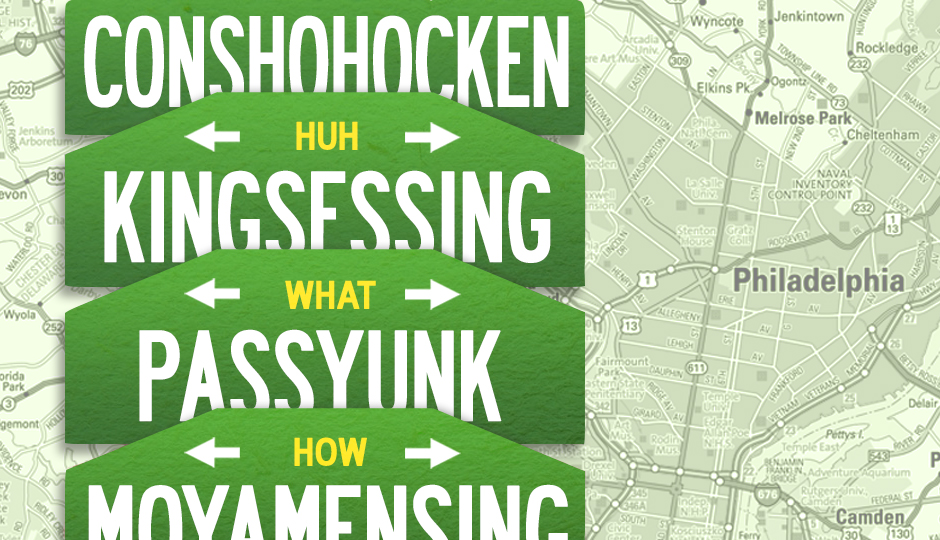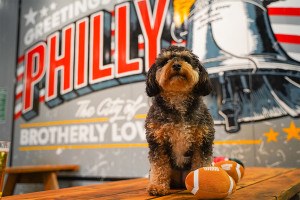20 Local Native American Place Names and What They Mean

Photo illustration by Rob DiRienzo and Alyse Moyer. Map via Shutterstock.com
It’s Columbus Day, which means that arguments are raging over how and whether to celebrate his arrival. The controversy reminds us of one sure truth: Long before the new urbanists planted their skinny jeans in these parts, the Native Americans known as the Lenni-Lenape inhabited the region they called Lenapehoking, which stretched from southern New York all the way through Eastern Pennsylvania and New Jersey down to Delaware. “Lenni” means “genuine” or “pure” or “real” or “original”; “Lenape” — properly pronounced “Leh-NAH-pay” — means “Indian” or “man.” These were the residents William Penn encountered when he arrived in 1682. They farmed and hunted here for eons before Europeans forced them into Ohio and then further west. But they left a number of their place names behind. Here are the meanings of a few.
Aramingo
The Lenape called the now-vanished stream in what would become known as the Northern Liberties “Tumanaraming,” or “wolf walk,” for the wolves that thronged the area. (They were still there when Europeans arrived.)
Conshohocken
The borough beside the Schuylkill River was once known as “Gueno-sheiki-hacking,” which means “pleasant valley.”
Kingsessing
The avenue is named for one of the first regions in the city settled by Europeans. The Lenape called this part of Southwest Philly “Chingsessing,” or “the place where there is a meadow.”
Lahaska
The Bucks County community most famous for housing Peddler’s Village was called “Lahaskeke,” or “the place of much writing.” Now? Much buying.
Manayunk
Surprisingly, even for the Lenape this was “place where we go to drink.”
Moyamensing
Nobody’s certain of the derivation of this name for an early village south of what was then Philly proper. It either means “place of judgment” or “pigeon excrement.”
Neshaminy
The mall and the creek take their names from the Lenape “Nischam-hanne,” meaning “double stream.”
Nockamixon
Now a state park and a township in Bucks County; then, “Nochanichsink,” or “where there are three houses.”
Passyunk
The hottest neighborhood in town took its name from that of a Lenape village. It’s got the same base as Passaic, New Jersey: “Pachsegink” meant “in the valley” or “place between the hills.”
Pennypack
The park, the creek and the neighborhood are from the Lenape word pënëpèkw, for “downward-flowing water.”
Perkasie
A creek and a town, it was originally “Poekskossing,” or “where the hickory nuts were cracked.”
Perkiomen
Township, creek, trail, bridge — all from “Pakihmomink,” or “where the cranberries grow.”
Poquessing
Our personal favorite, especially this time of year, when they move into our kitchen: “The place of the mice” is now a creek and a street.
Punxsutawney
Okay, it’s not really local, but isn’t it a great word? Originally “Punkwsutèney,” the groundhog’s home means “town of the sandflies.”
Shackamaxon
“Place of the council.” The site of this Lenape village, now in Fishtown, is home to Penn Treaty Park, where the aforementioned William Penn purportedly signed his famous peace agreement with Lenape chief Tamanend.
Skippack
A creek, a pike, a township, all with a name that was originally “Skappeu-hacki,” or “wet land.”
Susquehanna
The river, which runs from upstate New York all the way to the Chesapeake Bay, takes its name from “Siskëwahane,” meaning “mile wide, foot deep.”
Tohickon
Also a creek and a state park in Bucks County; the name comes from either “the stream over which we pass by means of a driftwood bridge” or “deer-bone creek.” Take your pick.
Tulpehocken
A creek and a SEPTA station, as well as a street in Germantown that legend says was once a Native American footpath. The word means “land of the turtles”; one of the Lenape clans was the Turtle Clan.
Wissahickon
The valley, avenue and creek all take their name from “wisameckham,” meaning “catfish stream.”
Follow @SandyHingston on Twitter.


